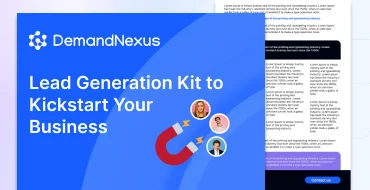Account-based marketing (ABM) campaigns redefine B2B marketing by zeroing in on high-value accounts with tailored, multi-channel strategies. Unlike traditional marketing’s broad approach, ABM campaigns—sometimes called ABX or programmatic ABM—deliver personalized content to engage key decision-makers, driving conversions and long-term loyalty. From ABM Lite to one-to-one tactics, these campaigns align sales and marketing to maximize ROI. This comprehensive guide explores the ABM campaign process, types, templates, and real-world examples, with a case study showcasing how DemandNexus powers B2B success.
What Is an ABM Campaign?
An ABM campaign is a targeted B2B marketing strategy that focuses on engaging specific high-value accounts with personalized content and outreach. By treating each account as a market of one, ABM campaigns align sales and marketing to deliver hyper-relevant messaging across channels like email, LinkedIn, and programmatic ads. Unlike traditional marketing, which prioritizes lead volume, ABM emphasizes quality, nurturing key accounts through the ABM funnel to conversion and beyond.
ABM campaigns integrate with account-based selling (ABS), creating a cohesive approach that combines marketing creativity with sales precision to drive revenue.
Benefits of ABM Campaigns
ABM campaigns offer distinct advantages for B2B companies, particularly those targeting enterprises or complex accounts:
- Higher ROI: Demand Metric reports 81% of marketers see ABM delivering better returns than other tactics.
- Shorter Sales Cycles: Engaging multiple stakeholders simultaneously can reduce cycles by up to 30%.
- Personalized Engagement: Tailored content resonates with decision-makers, boosting conversions.
- Sales-Marketing Alignment: Unified goals streamline the lead generation process.
- Resource Efficiency: Focuses efforts on high-potential accounts, minimizing waste.
Types of ABM Campaigns
ABM campaigns vary based on scale and personalization. Here’s a breakdown of the main types:
| Type | Description | Best For |
|---|---|---|
| One-to-One | Hyper-personalized campaigns for 1-5 high-value accounts. | Strategic, enterprise accounts |
| One-to-Few (ABM Lite) | Targets small clusters (5-30 accounts) with shared needs. | Mid-tier accounts in same industry |
| One-to-Many (Programmatic ABM) | Scales to 30+ accounts using automation and data. | Broader, less personalized outreach |
Choosing the right type depends on your resources, account value, and campaign goals.
ABM Campaign vs. Traditional Marketing
ABM campaigns differ significantly from traditional B2B marketing. Here’s a comparison:
| Aspect | ABM Campaign | Traditional Marketing |
|---|---|---|
| Focus | Specific high-value accounts | Broad audience |
| Personalization | Hyper-targeted content | Generalized messaging |
| Channels | Email, LinkedIn, programmatic ads | SEO, social media, PPC |
| Goal | Deep relationships, high ACV | Lead volume |
How to Build a Successful ABM Campaign: A Step-by-Step Template
Creating an effective ABM campaign requires a structured marketing process. Follow this template to plan and launch your campaign:
1. Choose the Right ABM Type
Decide whether one-to-one, one-to-few (ABM Lite), or one-to-many (programmatic ABM) suits your goals. For high-value accounts, one-to-one offers the most personalization, while programmatic ABM scales for broader reach.
2. Align Sales and Marketing
Unite sales and marketing teams to define shared objectives, such as targeting specific industries or increasing deal sizes. Regular syncs ensure consistent messaging and data sharing.
3. Build Your ABM Team
Assemble a cross-functional team, including:
- Sales Development Representatives (SDRs) for outreach.
- Marketing specialists for campaign creation.
- Content creators for personalized assets.
- Customer success managers for post-sale nurturing.
4. Define Your Ideal Customer Profile (ICP)
Create an ICP based on firmographics (e.g., company size, industry) and behavioral data (e.g., intent signals). Tools like lead research services help identify high-potential accounts.
5. Select Target Accounts
Build a target account list, prioritizing accounts with high revenue potential. Use first-party (e.g., website visits) and third-party intent data (e.g., competitor searches) to refine your list.
6. Craft Personalized Content
Develop account-specific content, such as:
- Customized whitepapers addressing industry challenges.
- Personalized cold email sequences.
- LinkedIn posts targeting decision-makers.
- Dynamic landing pages mentioning the account’s name.
7. Launch Multi-Channel Campaigns
Deploy campaigns across channels like:
- Email: Use tailored sequences to nurture leads.
- LinkedIn: Run targeted ads or InMail campaigns via LinkedIn lead generation.
- Programmatic Ads: Deliver account-specific banners using IP targeting.
- Webinars: Host industry-specific sessions for key accounts.
8. Track Engagement and Optimize
Monitor campaign performance using ABM metrics and A/B test content to improve results. Adjust strategies based on engagement data.
ABM Campaign Metrics to Measure
Tracking the right KPIs ensures your ABM campaign delivers results. Focus on these metrics:
| Metric | Formula | Why It Matters |
|---|---|---|
| Account Engagement | Interactions per account (clicks, views) | Shows campaign resonance |
| Pipeline Influence | Revenue attributed to ABM | Links campaigns to revenue |
| Conversion Rate | (Closed-Won Deals / Opportunities) * 100 | Measures closing success |
| Customer Acquisition Cost (CAC) | (Marketing + Sales Costs) / New Customers | Assesses efficiency |
Use platforms like HubSpot or Terminus to create dashboards for real-time tracking.
Case Study: DemandNexus Drives ABM Campaign Success for a SaaS Firm
A SaaS company offering cybersecurity solutions struggled to engage enterprise accounts, with only 12% of campaigns generating responses. DemandNexus crafted a high-impact ABM campaign to turn things around.
- Challenge: Low engagement and poor conversion rates for enterprise prospects.
- Solution: DemandNexus implemented a one-to-few ABM campaign, targeting 20 accounts with personalized LinkedIn ads, cold email sequences, and custom webinars. They used intent data to prioritize accounts and tracked engagement with a tailored dashboard.
- Results: Engagement rates soared to 65%, conversions increased by 30%, and pipeline influence grew by 40% in four months.
DemandNexus’s expertise in ABM campaigns, combining creative personalization with data-driven targeting, helps B2B companies achieve higher ROI. 
ABM Campaign Examples: Real-World Inspiration
These real-world examples showcase the power of creative ABM campaigns:
- Personalized Video Campaign: PartnerStack used tailored video messages promoted via LinkedIn ads, achieving a 33% response rate and converting 3 out of 100 accounts into customers.
- Direct Mail Campaign: Jellyvision sent customized mailers and branded kits to HR directors, boosting engagement with key accounts through industry-specific content.
- LinkedIn Outreach Campaign: Intelus Agency targeted SaaS founders with LinkedIn messages offering free trials, adding $2,000 in MRR in weeks.
ABM Campaign Template: A Ready-to-Use Framework
Use this marketing plan template to structure your ABM campaign:
- Objective: Define goals (e.g., convert 10 enterprise accounts).
- Target Accounts: List accounts with ICP criteria and intent data.
- Personas: Map decision-makers and their pain points.
- Content Plan: Outline assets (e.g., whitepapers, emails, ads).
- Channels: Specify email, LinkedIn, or programmatic ads.
- Timeline: Set milestones for launch and evaluation.
- Metrics: Track engagement, conversions, and pipeline influence.
Overcoming ABM Campaign Challenges
ABM campaigns face hurdles like stakeholder complexity and resource demands. Address them with:
- Multi-Threading: Engage multiple stakeholders to increase buy-in.
- Automation: Use programmatic ABM tools to scale personalization.
- Data Quality: Leverage intent-based marketing for accurate targeting.
Your ABM Campaign Playbook
ABM campaigns transform B2B marketing by targeting high-value accounts with precision and creativity. Start with a clear ICP, craft personalized content, and deploy multi-channel strategies. Track KPIs to optimize performance and drive conversions. Whether using one-to-one or programmatic ABM, a data-driven approach ensures success. Ready to launch your ABM campaign? DemandNexus offers expert solutions to build and execute high-ROI campaigns. Contact them today to elevate your B2B strategy.



